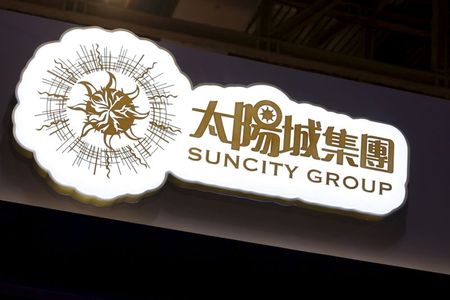By Eduardo Baptista and Anne Marie Roantree
HONG KONG (Reuters) – Macau casino stocks slid on Monday, rattled by the arrests of 11 people over alleged links to cross-border gambling and money laundering, with the founder of the gaming hub’s biggest junket operator among those detained.
Shares in MGM China plunged 10%, while Wynn Macau lost 7.8% and Sands China fell 5.3% as investors fretted about the near-term potential loss of business as well as the longer-term implications of the watershed hardline stance being taken towards the sector by authorities in Macau and mainland China.
Alvin Chau, the founder of Suncity – a junket operator that brings in high rollers to play at casinos, extending them credit and collecting on their debts – as well as the CEO of gambling sector investment firm Suncity Group Holdings, was among those arrested, Macau broadcaster TDM reported.
Macau authorities have previously said police were questioning a 47-year-old businessman surnamed Chau, without elaborating on his identity.
On Friday authorities in Wenzhou, a city in eastern China, issued an arrest warrant for Alvin Chau, accusing him of operating gambling activities in mainland China where gambling is illegal.
“Suncity accounts for over 50% of junket revenue (in Macau), which accounts for roughly 50% of gaming revenues, so Suncity accounts for 25% of gaming revenues,” said Carlos Lobo, a Macau-based gaming consultant.
“The impact on the gambling industry is huge … But (Suncity) is no longer too big to fail, the system will not collapse.”
Suncity Group Holdings did not respond to a Reuters request for comment.
Macau police said on Sunday the 11 people arrested had admitted some allegations, including establishing overseas gambling platforms and conducting illegal virtual betting activities, but had declined to cooperate on other issues.
Wenzhou authorities have accused Chau of forming a junket agent network on the mainland to help citizens engage in offshore and cross-border gambling activities as well as setting up an asset management company on the mainland to help gamblers make cross-border fund transfers.
NEW GAMBLING ERA
The tougher stance – which comes amid a broad regulatory clampdown in China on a range of sectors including tech and property – signals a new era for gambling in Macau and its relationship with mainland China, said Ben Lee, founder of Macau gaming consultancy IGamiX.
“It means that China will no longer tolerate Macau promoting in any form or manner gambling into the mainland,” he said.
He added that authorities, having learnt they could control the flow of visitors into Macau with the advent of COVID-19 border controls, had now moved on to controlling the type of visitors and that the special administrative region would now have to rely on mass-market gamblers instead of high-rollers.
Casino operators in the former Portuguese colony have recorded historic losses since the onset of the pandemic as China’s quarantine requirements have made it too costly for most mainland tourists to travel there.
The Macau units for U.S. casino operators Sands, MGM and Wynn each saw revenue plummet roughly 80% last year and the sector will also now have to contend with the potential threat to tourism posed by the new coronavirus variant Omicron.
Shares in Suncity Group, which has a market valuation of HK$1.7 billion ($220 million), were suspended from trade on Monday after tumbling 165% so far this year.
Before the COVID-19 pandemic, Macau’s government obtained more than 80% of its tax revenues from the gambling industry, which employed about three-quarters of the territory’s 600,000 population, either directly or indirectly.
($1 = 7.7989 Hong Kong dollars)
(Reporting by Eduardo Baptista and Anne Marie Roantree; Additional reporting by Sara Cheng; Editing by Edwina Gibbs and Emelia Sithole-Matarise)





